Response to Veterinary Recommendations of Hydrolyzed Diets

In June of 2020, an article titled “8 Royal Canin Hydrolyzed Protein Dog Foods with Reviews” was published to the Pet Care Advisors website stating the benefits of a hydrolyzed protein diet for pets. We found this information to be misguided, incorrect and in need of clarification as some veterinarians are giving it to pet owners as an answer to health issues. According to the original article:
- Hydrolyzed diets are vital for pets suffering from food sensitivities.
- They are helpful to pets suffering from Chronic Enteritis (inflammation of the small intestine) and Inflammatory Bowel Disease (IBD).
- They are highly digestible and may benefit pets with Exocrine Pancreatic Insufficiency (EPI).
- They are hypoallergenic and will bring down the chances of other protein-related allergies.
- It also goes on to tout the “competence” of Royal Canin as a company saying they have a long track record of making pet food that supports nutritional needs as well as veterinary exclusive diets that target many health concerns.
If you would like to read the original article, it can be found here: https://petcareadvisors.com/dogs/royal-canin-hydrolyzed-protein-dog-foods-reviews/.
So, what IS a hydrolyzed diet, anyway? It is made from an animal or plant by-product, such as chicken carcasses or soy protein, which is boiled in hydrochloric acid in order to start the process of breaking the protein down. After that, it undergoes an additional cooking process involving very high heat and is then treated with even more chemicals which turns it into an unnatural mass of protein for your pet’s food. Sounds tasty, right? In theory, the purpose of this is to break the protein into such small particles that our pet’s immune system will not be able to recognize it and so avoid an immune response.
Let’s Address These Issues…
Most pets with the issues mentioned above are already on processed, heated, carbohydrate heavy (dry) foods with low quality protein ingredients that are not easily digested or absorbed by our pets’ bodies. Thus, their immune system is functioning at low capacity resulting in allergic reactions. What is not being questioned is the quality of protein that is in the pet’s diet to begin with. Based on the fact that dogs and cats are naturally carnivores who eat FRESH food, it makes more sense to increase the quality of protein they are eating rather than decrease it through hydrolysis. So no, these diets are not vital for pets suffering with food sensitivities – fresh, living foods are.
There are plenty of beneficial bacteria and enzymes in fresh foods that boost the immune system. Feeding in this way is what will actually “bring down the chances of other protein-related allergies.” This also assists in preventing and treating Exocrine Pancreatic Insufficiency, which is when the pancreas is not producing enough digestive enzymes to break down and absorb vital nutrients. This condition is often brought on by chronic pancreatitis which is caused by over taxation of the pancreas due to our carnivorous pets eating a processed, carbohydrate filled diet. A similar connection can be made for pets suffering from GI Inflammation; it is due to the lack of a diet that is species-appropriate for dogs and cats.
Dr. Karen Becker, DVM states, “The need for allergen-free (hypoallergenic) pet food is the result of years of feeding cats and dogs commercial diets containing poor-quality protein, grains, fillers and potentially toxic additives and preservatives.” The fact of the matter is big pet food companies are at the root cause of pet allergies. They educate and fund many veterinarians who are taught to look directly to protein-related allergies as a cause rather than looking to a pet’s biology for the natural cure.
Finally, we’d like to address Royal Canin’s inflated claim to fame about producing diets that support specific nutritional needs and target many health concerns. Considering that dogs and cats are designed to need the same nutritional requirements throughout their life, when they are fed a diet of fresh, meat-based foods, these needs are met. A high carbohydrate kibble, however, does not meet the needs of our carnivorous pets, especially one in which the protein level doesn’t even meet AAFCO’s (American Association of Feed Control Officials) minimum crude protein requirement of 22%. The majority of Royal Canin’s hydrolyzed dry diets have a minimum crude protein content ranging from 16.9% to 22%, falling well below, or just right at, those minimum nutritional requirements. The article goes on to say, “Royal Canin hydrolyzed pet foods are top of the notch, delicious, and nutritious.” The ingredients in their foods are the significant thing to be aware of, and they speak volumes for the nutritional quality of these foods. Here is a brief explanation of just a few common ingredients they feel “benefit” your pet:
- Brewers Rice: This is a rice by-product that’s used as a filler to inexpensively bulk up foods and has very few nutrients.
- Hydrolyzed Soy or Animal Protein: This is made by breaking down large soy protein or animal carcass molecules into their smaller, constituent amino acids by a chemical process. Hydrolyzed proteins are used as flavor enhancers and are commonly preserved with a chemical (BHA) that is believed to be carcinogenic. Also, soy itself is a known allergen among cats and dogs.
- Dried Beet Pulp: This is a fibrous by-product of the sugar beet and cannot be digested in your pet’s small intestine. Too much can bind and clog a pet’s digestive tract.
- Powdered Cellulose: This is made by cooking raw plant fiber—usually wood—in various chemicals that is then purified. Insoluble dietary fibers like cellulose aren’t digestible, so they add bulk to food without making it more fattening. This is wood pulp, otherwise known as sawdust.
What We Recommend…
Luckily the answers here are quite simple: Feed dogs and cats the way Nature intended. Royal Canin and similar companies are over-complicating pet food. Dr Karen Becker, DVM answers perfectly, “Species-appropriate nutrition is allergen-free pet food.”
We recommend focusing on what your pet’s body needs to thrive. This includes:
- Plenty of high quality animal protein from fresh muscle meat, organ, fat and bone.
- High moisture content. Fresh prey is about 70% water.
- Just enough vegetables and fruits to mimic the stomach contents of prey for vitamins and minerals.
- Plenty of live probiotics and enzymes to assist the body in digesting and utilizing nutrients.
This can be easily accomplished with any of the complete and balanced frozen or freeze-dried raw diets at The Wild. While all of our options are species-appropriate, Answers Raw Food would be a specific alternative to the Hydrolyzed Protein diet due to the pre-digested nature that the fermentation process gives to all of their products.
Add probiotics and enzymes easily with K-9 Kraving’s Raw Pancreas, Primal Raw Goat’s Milk, Steve’s Raw Goat’s Milk Yogurt, Answer’s Raw Fermented Goat’s Milk or Cow’s Milk Kefir, Nature’s Farmacy Digestive Enhancer or Probiotic Max, Animal Essentials Plant Enzymes, or Ark Naturals Gentle Digest.
At The Wild we are here to help you take the next right steps for your pet and will set you up for success every step of the way. Our employees undergo intensive training in nutrition including formal Pet Food Nutrition Certification. If your pet is dealing with sensitivities and allergies, talk in detail with any associate at The Wild to determine the best route to take for your specific situation.
References
- https://healthypets.mercola.com/sites/healthypets/archive/2021/01/17/hydrolyzed-pet-food.aspx?ui=907abae023fe54a49d50118336d66f274c1d363f355eb7639a5ba54ee3279d18&cid_source=petsnl&cid_medium=email&cid_content=art1HL&cid=20210117Z1&mid=DM770987&rid=1061110034
- https://www.dogsnaturallymagazine.com/let-them-eat-pine-feathers-and-pine-trees-in-pet-foods/
- https://www.youtube.com/watch?reload=9&v=TWH3XfvMMCc (Dr. Becker’s video: Exocrine Pancreatic Insufficiency (EPI) In Dogs)


